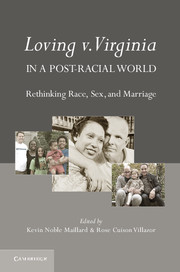Book contents
- Frontmatter
- Contents
- About the Contributors
- Acknowledgments
- Foreword
- Introduction Loving v. Virginia in a Post-Racial World
- Part One Explaining Loving v. Virginia
- Part Two Historical Antecedents to Loving
- Part Three Loving and Interracial Relationships: Contemporary Challenges
- Part Four Considering the Limits of Loving
- Part Five Loving Outside the U.S. Borders
- 14 Racially Inadmissible Wives
- 15 The Military and Interracial Marriage
- 16 Loving Across the Miles
- Part Six Loving and Beyond: Marriage, Intimacy, and Diverse Relationships
- Permission Granted
- Index
- References
15 - The Military and Interracial Marriage
Published online by Cambridge University Press: 05 July 2012
- Frontmatter
- Contents
- About the Contributors
- Acknowledgments
- Foreword
- Introduction Loving v. Virginia in a Post-Racial World
- Part One Explaining Loving v. Virginia
- Part Two Historical Antecedents to Loving
- Part Three Loving and Interracial Relationships: Contemporary Challenges
- Part Four Considering the Limits of Loving
- Part Five Loving Outside the U.S. Borders
- 14 Racially Inadmissible Wives
- 15 The Military and Interracial Marriage
- 16 Loving Across the Miles
- Part Six Loving and Beyond: Marriage, Intimacy, and Diverse Relationships
- Permission Granted
- Index
- References
Summary
This chapter supplements our historical view of restrictions on mixed marriages and relationships by exploring the impact of social norms and state law on the regulation of sexualized relationships in the U.S. military. The specific focus of this essay will be interracial, heterosexual, and transnational relationships from the Spanish-American War through the first half of the twentieth century, a period of significant economic and social change that included overseas military operations during the Spanish-American War, three major U.S. Marine Corps interventions in the Caribbean and Central America, World War I, and World War II. These operations led to interracial encounters between White GIs and local women of color in the Philippine Islands, the Caribbean, and East Asia, and between GIs of color and White women in the United Kingdom, Europe, and Australia. I call for a deeper exploration of the ways in which the military regulated sexual relations between male soldiers and foreign women, particularly women of color, in order to illuminate the varied ways that marriage was policed along racial lines.
This chapter begins by outlining the military regulatory framework governing private sexual conduct. It continues with a description of the social context and specific details about heterosexual encounters during overseas military operations prior to the Korean War. This section primarily focuses on interracial relationships and encounters involving marriage. The circumstances where these encounters take place involve the sometimes volatile mix of young men emerging from long periods of hypermasculine social isolation and young women ready to extend some form of hospitality. These circumstances created situations where policies about race, gender, class, nationality, and sex could potentially clash and force a shift in the underlying values. The incidents show how, instead of clashing, a neat alignment of values reinforced and upheld a particular view of American citizenship. Importantly, they illuminate the ways in which legal and cultural norms about interracial relationships within the United States affected the military’s regulation of interracial relationships in foreign lands.
- Type
- Chapter
- Information
- Loving v. Virginia in a Post-Racial WorldRethinking Race, Sex, and Marriage, pp. 208 - 216Publisher: Cambridge University PressPrint publication year: 2012



